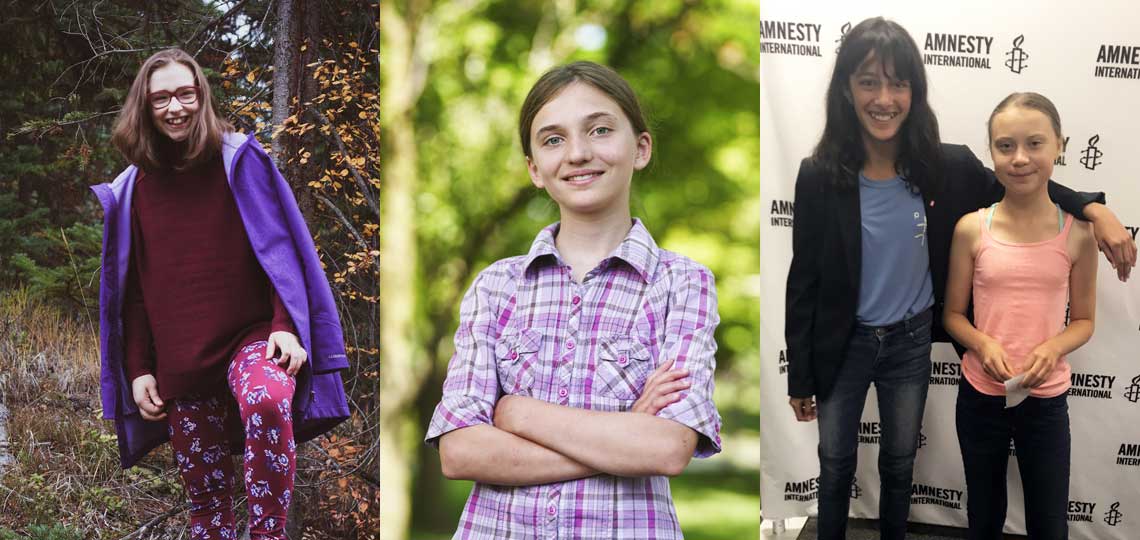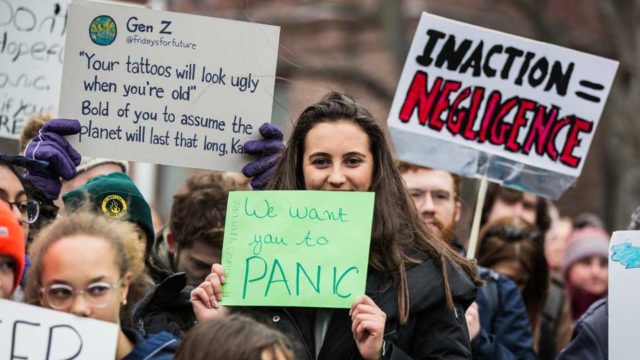Youth climate activists Emma-Jane Burian, Sophia Mathur, and Zoe Keary-Matzner have spent months preparing for this moment.
On Sept. 27, people across Canada and around the world will take to the streets in a global climate strike. It’s the second of two worldwide days of action, timed just before and right after the 2019 UN Climate Action Summit.
Emma-Jane (16, of Victoria, B.C.), Sophia (12, of Sudbury, Ont.), and Zoe (also 12, of Toronto, Ont.) are Fridays for Future leaders in their hometowns. As part of a world-wide network of youth taking action, they’ve organized, led, and given speeches at their local rallies since the movement first came to Canada.
Up until this point, their focus has been on mobilizing students. The Sept. 27 strike, however, will be different. This time, everybody’s invited.
Here at Ecojustice, staff from our offices across the country are planning to show their solidarity with the Fridays for Future strikers by attending demonstrations in Halifax, Ottawa, Toronto, Calgary, and Vancouver. We’ve also been thinking about how we can support the movement beyond Sept. 27.
In the lead-up to the big global strike, we asked Emma-Jane, Sophia, and Zoe how to best back the Fridays for Future movement.
The young activists told us two things: First, show up. Find out where your local strike is and make sure you’re there.
Second, use your ability to vote for good. If you’re old enough to vote, you have a responsibility to cast your ballot for a safe climate future on October 21 (or in advanced polling).
Here’s what else these youth climate activists had to say:
Emma-Jane Burian, Victoria
Ecojustice: Why are you striking?
Emma-Jane: I’m striking for a better world. The climate crisis is forcing us to get out of our narcissistic worldview and teaching us how to live altruistically. For strikers around the world, coming together gives us hope and building community gives us joy.
This is why I strike.
Ecojustice: How is the Sept. 27 strike different than past strikes?
Emma-Jane: In Canada, we are ramping it up. With the election looming, we want to tell all politicians and candidates that they must take strong leadership on climate.
We will not stand any moment longer for lots of words but no action. We are doing this to scare politicians, to change political will. We are shaking things up, saying “no more business as usual.”
In order to do this, we need more than students. We need EVERYONE.
Ecojustice: What message would you send to people who can vote in this election?
Emma-Jane: I hope all Canadians read Canada’s Changing Climate Report and the IPCC report when considering who to vote for. Think about our generation and generations not yet born. Please ask yourself: How can my vote impact the generations to come? If you have children, ask them who they want you to vote for and vote for them.
Whatever you do, please vote for the future and vote with your heart. That’s what matters most.
Sophia Mathur, Sudbury
Ecojustice: What have you been up to in September, in terms of climate activism?
Sophia: September has been an incredible month for me. I’ve continued to participate in climate strikes at city hall in Sudbury, where I live, and I marched with tens of thousands of people in New York on Sept. 20.
My biggest moment this month came when I travelled by train to the U.S. to meet Greta Thunberg, and was invited to be on stage with her and other activists, like Kumi Naido, when she received the Amnesty International Ambassador of Conscience Award.
I also attended climate meetings in Washington, D.C., with other youth climate activists, including plaintiffs in the Juliana v. United States case.
Ecojustice: What was it like to meet Greta Thunberg?
Sophia: Greta is a kind and humble person. It’s not fair that Greta and all the youth strikers have to give up their childhood to protect their future.
Ecojustice: What message would you send to people who can vote in this election?
Sophia: I wish I could vote. I can’t vote in this election or the next election in 2023. How you vote will determine my future. So vote and vote for the climate.
But not only should you vote – you should attend climate marches to support youth.
Ecojustice: Anything else you’d like to add?
Sophia: Last year I took 21 days off of school to fight for the climate. In September alone I will have taken seven days of school plus two Friday afternoons. My grades are suffering. And I am falling behind on my piano. What is the point of preparing for future if there will be no future?
Zoe Keary-Matzner, Toronto
Ecojustice: How do you feel about the fact you can’t vote this election?
Zoe: I feel angry because I know that not all adults will make a choice to protect our world. Also, I feel angry because in this election my future is at stake, and I can’t even say who I want to be in control of it! I also feel anxious because I’m scared that people are going to make a bad choice and elect someone who will harm our world severely.
Striking in the September 27th strike shows people that we need to elect someone with climate change as their top priority. This is a very big action, and even if you can’t go to all the other strikes, going to this one says a lot.
Ecojustice: What message would you send to people who can vote in this election?
Zoe: I would send this message: Think about your kids, and how if you vote for someone who doesn’t care about climate change, they will have a shorter and more miserable life. Please, please try to vote for someone who cares about the world. I want to live in a world that’s full of life.
Remember: the future of our planet is basically in your hands, and you get to decide what to do with it.
Ecojustice: Anything else you’d like to add?
Zoe: I would also like to say that the fires in the Amazon are a very serious issue, and if we write to politicians and people in government, we can do something about it! The more letters we write, the more they will put pressure on the government in Brazil to do something about it.
Answers have been edited for length.



